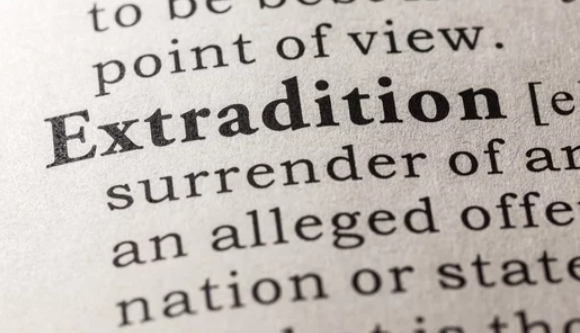Make it make sense – Understanding extradition
By: Natasha Archary

When we see extradition processes unfolding on the news, it’s usually chaotic scenes from airports, with many officials, and an individual who has been brought back to South Africa under police supervision.
The conversation on Drive 959 was sparked by Ace Magashule’s former PA being extradited from the US.
Moroadi Cholota, who had been studying in the US, landed on home soil on Thursday last week, following attempts to stop her extradition.
What is extradition and why is it such a complicated process? How are these cases negotiated between 2 countries when their laws are different? (Role of Treaties, International Law, INTERPOL etc) Gladys Mutele helps us make sense of this with Brigadier Athlenda Mathe of the National Joint Operational and Intelligence Structure.
What is extradition?
Extradition is a critical component of international law that allows for individuals accused or convicted of crimes to be transferred from one country to another.
In South Africa, the extradition process is guided by national legislation and international treaties, making it a complex but essential part of the country’s legal system.
Legal Framework for Extradition in South Africa
The extradition process in South Africa is primarily governed by two key pieces of legislation:
- The Extradition Act 67 of 1962: This act outlines the procedures and requirements for extraditing individuals to and from South Africa. It provides the legal foundation for the country’s extradition agreements with other nations and stipulates the conditions under which extradition can occur.
- The Criminal Procedure Act 51 of 1977: While this act primarily deals with the administration of criminal justice within South Africa, it also includes provisions related to the arrest and detention of individuals sought for extradition.
Listen to the conversation on Drive 959:
The Extradition Process in South Africa
The extradition process in South Africa involves several steps and requires careful coordination between various legal and governmental bodies. The process generally includes the following stages:
Request for Extradition: The process begins when the government of a foreign country submits a formal request for the extradition of an individual residing in South Africa. This request must include details of the charges against the individual and evidence supporting the request.
Review by the Minister of Justice: The Minister of Justice and Constitutional Development reviews the extradition request to determine its validity and ensure that it meets the legal requirements. The Minister has the discretion to accept or deny the request based on various factors, including the nature of the alleged offense and the terms of the applicable extradition treaty.
Issuance of an Arrest Warrant: If the Minister approves the request, an arrest warrant is issued for the individual sought for extradition. The South African Police Service (SAPS) is responsible for executing the warrant and arresting the individual.
Extradition Hearing: Once the individual is arrested, they are brought before a magistrate for an extradition hearing. During this hearing, the court examines the evidence provided by the requesting country and determines whether the individual should be extradited. The court considers factors such as the seriousness of the alleged offense, the individual’s rights, and the likelihood of a fair trial in the requesting country.
Appeals and Final Decision: If the magistrate orders extradition, the individual has the right to appeal the decision. The appeal process can be lengthy and may involve multiple levels of review, including the High Court and the Supreme Court of Appeal. Ultimately, the Minister of Justice makes the final decision on whether to extradite the individual.
Extradition and Transfer: If the extradition order is upheld, the individual is handed over to the authorities of the requesting country for transfer. The transfer is typically coordinated between the SAPS and the foreign country’s law enforcement agencies.
Also read: Yes, people are still being scammed by their lover
Written by: Natasha
Similar posts
MORE ARTICLES

Unpacking a case of an employee who falsely accused a colleague of being the father of her child

PICS: Guess the Kaya 959 presenter

Powerball Results: Draw Friday, 18 April 2025

‘My wife chose her sister’s party over my family’s tombstone unveiling’ – The Blind Spot

RAF urges responsible road use this Easter amidst R45.6 billion in claims
QUICK LINKS
UpComing Shows

The Hive
With Bonolo "Bee Sting" Molosiwa
Every "Hive" needs a Queen B and Bonolo "Bee Sting" Molosiwa is Kaya 959's honey who brings in the money. With her bubbly personality, infectious laugh, Bee Sting radiates positive energy which is all you need to get your weekend off to the best start. Don't miss the Afrobeat Dancehall Ragga (ADR) Top 10 on The Hive with Bee Sting every Saturday from 18h00 - 21h00.
close
Tune and Chill
with Tyroline Franks
Tune and Chill with Tyroline Franks on Kaya 959. Weekends, Saturday and Sunday, 15pm-18pm.
close
On the Beat
On the Beat with George Manyosi on Kaya 959. Saturday's, 18pm-21pm.
close
Touch of Soul
With T Bose
Kaya 959 takes back Sundays with A Touch of Soul, the only show bringing you soul and RnB music that touches your mind, body and spirit. The Best T in the City, T-bose takes you back to a time when music was made to last. A Touch of Soul is the perfect wind-down to your weekend. Sundays 14h00 to 18h00.
close
The Jazz Standard
with Brenda Sisane
The Jazz Standard with Brenda Sisane. Sunday's 12:00-15:00.
close
Spade of Hearts
With Xola Dlwati
WITH XOLA DLWATI: SATURDAYS 12:00 -15:00 Spade of Hearts is a fuse of love and soulful sounds, pulling at your heartstrings. Tune in for songs that will take you down memory lane. It is the sound that once dominated your playlist. It airs Sundays 12:00 – 15:00.
closeConnect with Kaya 959
DownLoad Our Mobile App
© 2024 Kaya 959 | On The Street On The Air









